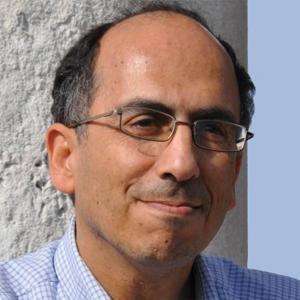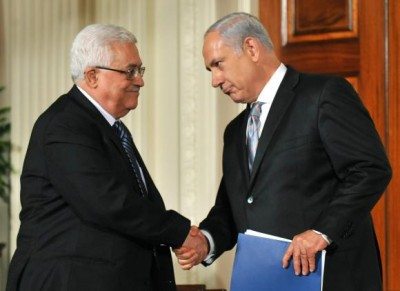www.aljazeerah.info
Opinion Editorials, August, 2016
Archives
Mission & Name
Conflict Terminology
Editorials
Gaza Holocaust
Gulf War
Isdood
Islam
News
News Photos
Opinion Editorials
US Foreign Policy (Dr. El-Najjar's Articles)
www.aljazeerah.info
Some Thoughts About Term Limits in Public Office
By Mazin Qumsiyeh

Al-Jazeerah, CCUN, August 22, 2016
 |
|
| Mahmoud Abbas Benjamin Netanyahu, Paris 2010: Without new elections or term-limit, they occupy office permanently! |
Can we have an honest objective discussion of term limits in public life? It has become common practice to hear people speak about those in office who are wed to their chair and refuse to let others take over what they consider to be their position. Whether it is those who have a renewal of their position like members of the US congress and the senate who became career politicians by running for elections (no term limits) or those who are set in a position like a king or perpetual president by virtue of other arrangements. We find people like Yasser Arafat and Mahmoud Abbas basically enjoy their acquired positions and age and even die in office. We joke that we never have a living ex-president in the Arab world.
But sometimes it is easy to pick on politicians when people have much closer examples. Thousands of non-governmental organizations run by the same person sometimes for decades. Many academic leadership positions in our universities seem to have unchanging faces. There are some who will argue that experience trumps new blood. Might it not be good to have the >25 year experience of Saeb Erekat (“Chief Negotiator” and author of “Life is Negotiations”)?
Further, when you do have term-limits, you may still get the same outcome
via other ways. Case in point Bush Jr coming to office of US President after
Bush senior or the impending return to the white house of the Clintons. And
in systems like the Israeli apartheid system or the American “democracy”
does it really matter to common people’s lives whether it is a leader of one
or the other party that takes office? Aren’t there well known “rulers” (the
military-industrial-financial elite circle) that run the show any way? Or
should we take the revolutionary line and vote for a third party candidate
to stir the pot?
Can either Clinton or Trump really take power away
from the Federal Reserve (private bankers who print money at their whim)?
Can either of them stand-up to the Israel lobby that cost tax payers over 6
trillion dollars and cost hundreds of thousands of deaths? So the question
comes to issue of power and who wields it and for what purpose. Do the
people have power to change things? Would demanding term limits in smaller
offices (like universities and small NGOs) and perhaps also demanding
transparency and accountability and outcomes in these institutions have a
ripple effect up the hierarchy to state and national offices? Some people
impose their own limits on their power and on their positions. But usually
those are the humble ones who get replaced by egotistical individuals.
As I pondered these things it occurred to me that remarkably little
discussion of such matters go on. Discussions must also lead to action. If
the system is rotten, stirring a bit might be the best possible outcome.
Water gets stagnant if it is not stirred and oxygenated. Now the
Palestinians will go to municipal elections. Avigdor Lieberman renewed the
plans of his predecessors of “carrots and sticks” promising collective
punishment for towns which show any signs of resistance and collective
easing of repressive occupation measures for towns that have 100%
compliance. He mentions the town where I was born as a compliant town!
Alas we have much work to do as we challenge not just the occupation but
a system f compliant leadership in towns that have historically been known
to be models of resistance. But the question remain that if you get rid of
the entrenched forces who have been comfortably in office for years, do you
really have good smart, young leadership to take over? And what about youth
and women voices? Can we afford the change or can we afford not to
change? Considering that Palestine remains under occupation and the
situation gets worse every day (more sellers, more home demolitions etc),
what do we have to lose from trying new things? Isn’t this also true at the
global level? Revolution anyone?
We may want to at least live in
dignity and maybe even die in dignity (ala Vittorio Arrigoni and Rachel
Corrie).
Mazin Qumsiyeh
Professor and (volunteer) Director
Palestine Museum of Natural History
Palestine Institute of Biodiversity
and Sustainability
Bethlehem University
Occupied Palestine
http://qumsiyeh.org
http://palestinenature.org
Share the link of this article with your facebook friends
|
|
|
|
||
|
||||||


